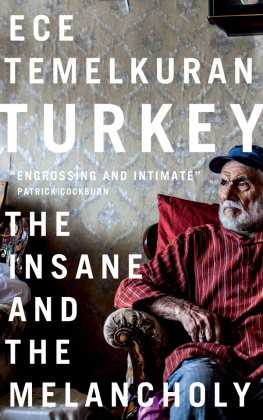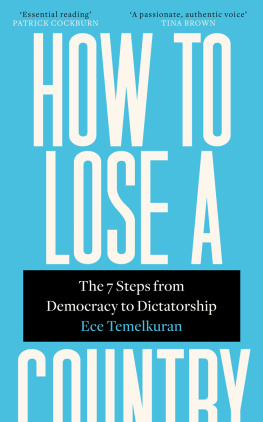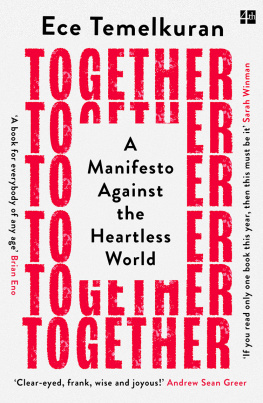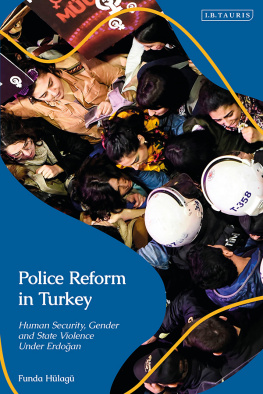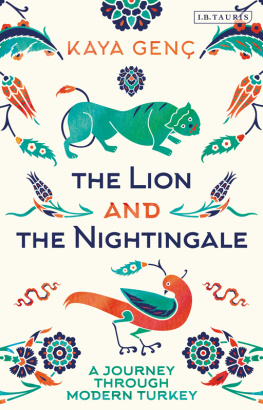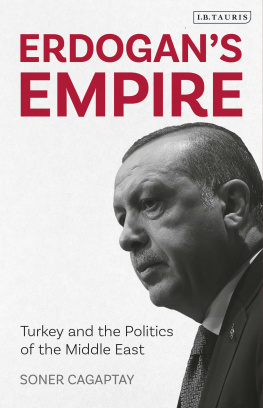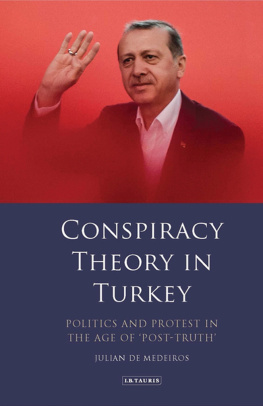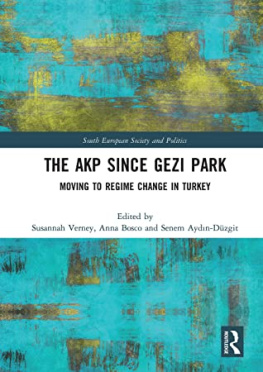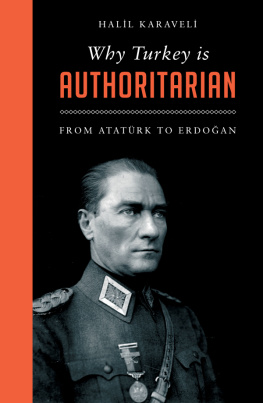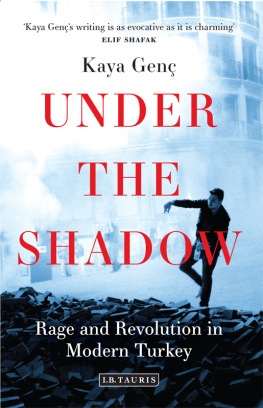
MORE PRAISE FOR TURKEY:
THE INSANE AND THE MELANCHOLY
What a brave woman! And what a fine, stylish and intelligent writer! Mixing sarcasm, anger, wit, and irony as well as hard facts, Ece Temelkuran has provided us with an informative and moving account of Turkeys seemingly inexorable drift into authoritarianism.
Donald Sassoon, author of The Culture of the Europeans
Part guide, part confidante, Ece Temelkuran brilliantly captures the neurosis at the heart of her country. An important book for anyone who wants to understand modern Turkey.
Padraig Reidy, editor of Little Atoms
ABOUT THE AUTHOR
Ece Temelkuran is one of Turkeys best-known authors and political commentators. She was previously a columnist for the Milliyet newspaper, before her outspoken criticism of government repression led to her losing her job. Her previous books in English include Deep Mountain: Across the TurkishArmenian Divide (2010) and the poetry collection Book of the Edge (2010).
Ece has lived in Tunisia, Lebanon, Paris and Oxford to write her novels, which are published in several languages, and now divides her time between Istanbul and Zagreb.
TURKEY
THE INSANE AND THE MELANCHOLY
ECE TEMELKURAN
TRANSLATED BY ZEYNEP BELER

Zed Books
LONDON
Turkey: The Insane and the Melancholy was first published in English in 2016 by Zed Books Ltd, The Foundry, 17 Oval Way, London SE11 5RR, UK.
www.zedbooks.net
Ece Temelkuran, 2015
Kalem Agency, 2015
The right of Ece Temelkuran to be identified as the author of this work has been asserted by her in accordance with the Copyright, Designs and Patents Act 1988.
Typeset in Haarlemmer by seagulls.net
Index by John Barker
Cover design by Clare Turner
Cover photo Ivor Prickett/Panos
All rights reserved. No part of this publication may be reproduced, stored in a retrieval system or transmitted in any form or by any means, electronic, mechanical, photocopying or otherwise, without the prior permission of Zed Books Ltd.
A catalogue record for this book is available from the British Library.
ISBN 978-1-78360-890-4 hb
ISBN 978-1-78360-889-8 pb
ISBN 978-1-78360-892-8 pdf
ISBN 978-1-78360-891-1 epub
ISBN 978-1-78360-893-5 mobi
To the young people who died in the recent struggles, whose coffins were heavier than their bodies.
CONTENTS
INTRODUCTION
YESTERDAY
This is Turkey!
This is quite possibly the most often used phrase in Turkey on any given day. It is used to allude to extraordinarily ludicrous situations and events. Always accompanied by a sardonic smile, in truth devoid of meaning, there is an agreement on a national level that the phrase can somehow account for anything. For instance, if an ambulance is late and then proceeds to run over the patient and kill him, you are allowed to say, in dramatic tones: Thats Turkey!
You could plausibly laugh and say the same thing in the event that you observe a driver on the highway with his foot sticking out of the window with no apparent casualties left in his wake: Thats Turkey!
But wait! If youre kissing someone in plain sight in Istanbul and someone jabs you on the shoulder to shout the following, you have been warned:
Whoa! This is Turkey! None of that here!
Youd benefit from knowing that kissing is less seemly to the people of this country than fighting.
A sentence that begins with This is is quite crafty, simultaneously positing and dismissing shock. It both boasts of a certain distinctiveness and explains away any lack of improvement as some kind of unalterable fate. It speaks of the melancholy of taking the great, long madness known as Turkey for what it is, of getting used to that madness, or, more accurately, resigning oneself to it. This phrase constitutes the core of the tragicomic nature of a country where every message has at least two meanings:
This is Turkey!
That is all fine and good, but what is this place?
Perhaps this isnt even a place. For, according to the definition taught since the countrys founding, this is a bridge . Between the East and the West and between Asia and Europe. Between the Orient and the Occident. This in between-ness has engendered hesitancy in the imaginations of nearly everyone who hails from here. As it is, from which side of the bridge does one best describe the bridge? According to the Republic founded in 1923, the answer is self-evident.
Every generation since the founding of the Republic of Turkey has studied the same map of the country at their desks in elementary school. According to this map, Turkey was the biggest country in the world and, naturally, in the very middle. It stood as a colossus in the midst of our founding father Atatrks pledges: Turk, be proud, work and trust! and Happy is the man who calls himself a Turk! Europe hovered above, full of colour. Inside the spectral countries were cities with pretty names and rivers of bright blue. Our forefathers praised this Eldorado as the ideal goal. Below was the East. The East was always grey-yellow in colour. Like the USSR, it resembled a desert or a rough, hazy void. The cities were marked haphazardly. In this incarnation, the map said:
Dont look down or to the right, look up. Above is a colourful and vivacious life. There is nothing below other than the dirty Arabs and camels. There is nothing worthy of your curiosity. Get yourself out of there and run towards the West as fast as your feet can carry you.
On this map, the Republic thought it more fitting to define this country that bridged Asia and Europe, its government, and the children born here, by the west side of the bridge. It presented this passage existence as an identity to be proud of, not something to hesitate about so much so that you would think we were all that was keeping the East and the West from being completely severed, and the whole world from simply falling apart. Thank heavens for Turkey! And it was our fate to swim towards the West in a perpetual state of passage.
However, those on the bridge had two big problems concerning who they were and what this place was. First of all, regardless of how breathlessly they swam towards the West, they kept being tugged backwards by the East side of the bridge. And that wasnt their only nightmare. Under the founding fathers orders, they also had been given the mission of rising to the level of the people of the West and then surpassing that level. In his famous speech marking the tenth year of the Republic, Atatrk had ordained that we must rise above the level of the conquering civilisations. This mission burdened people even more. They knew they were below, but with the bravado of being on the same level as those above, and they were simultaneously tugged backwards by the sense of insignificance pressuring them from the East side of their existence. They were pulled this way and that by an existential vacuum with dual suction: greatness and insignificance. It was as though Turkey had been cursed with the inability to find a mirror that would show it as it was, without overstating or understating.
And as if this werent enough, another duality woven into the lands destiny served to doubly confuse the inhabitants of the bridge. On the tiny piece of land left over from the loss of an entire empire, even those who had thoroughly experienced the tragedy of war perceived the founding of Turkey to be a great victory. The Ottoman had only been a burden anyhow! Young Turkey was ground zero, a new leaf. For a people who had lost everything to war, such motivation was naturally a necessity, but resetting history came at a cost. The before was abolished. We were grandchildren of a colossal empire, but that empire was worthless! Formal history invalidated the era of the empire, yet we all had to learn about the sultans and their times. The year 1923 constituted a milestone, but one with which we admittedly had an ambiguous association. Before was at once distasteful and a source of pride to us, a sovereignty we emulated even as we held it in contempt. The inhabitants of the bridge grew up with the befuddlement of children who witnessed history first-hand and then had to memorise a completely different version of events from the one they had witnessed. They became so accustomed to having everything labelled backwards that it no longer seemed strange that every sign had a double meaning. This is why the people of Turkey have never found the reaction This is Turkey! odd: they are used to experiencing shock and indifference, laughter and tears. And they dont find it strange that they must both protest against and adapt to the situation, or that they have been forced to live with such complicated psyches.
Next page
